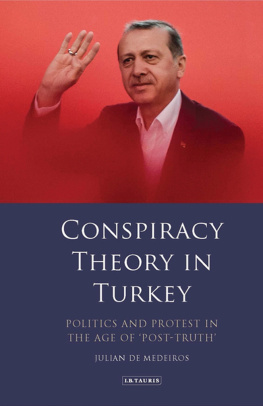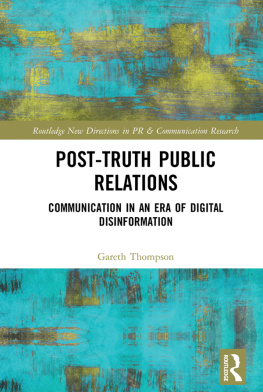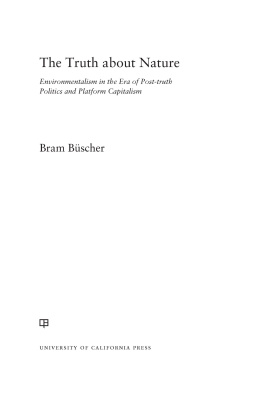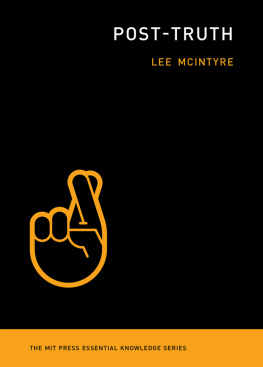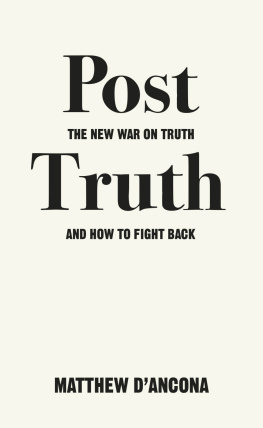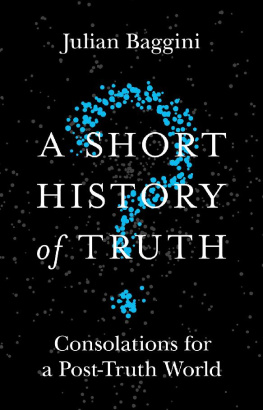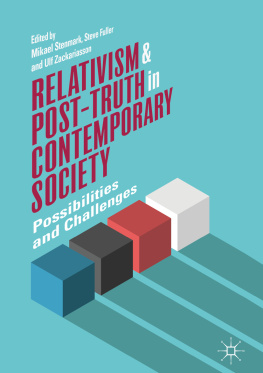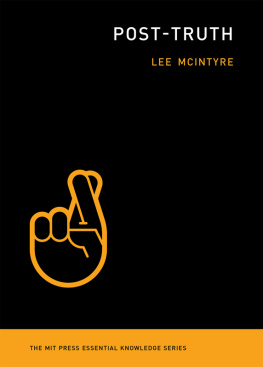Post-Truth Imaginations offers the most comprehensive and sophisticated treatment of post-truth phenomena to date. The book adopts the standpoint of Science and Technology Studies, the field that has been at the heart of the matter from day one. The editors are to be congratulated for the range of voices heard in these pages and the subtlety of the considerations conceptual, empirical and practical that they bring in coming to terms with our post-truth condition. The diagnoses and strategies proposed here are diverse, but there should be something here for anyone who has thought hard about post-truth, whether it be in the spirit of warm embrace or fear and loathing.
Steve Fuller, author of Post-Truth: Knowledge as a Power Game and A Players Guide to the Post-Truth Condition, UK
This book offers a comprehensive overview of the various aspects of post-truth and a deep and novel understanding of its epistemology and politics. It is wide-ranging and deeply insightful, empirically rich and theoretically innovating. Post-Truth Imaginations moves beyond the immediate concerns of fake news, false evidence and failing science communication as it centres on one of the biggest questions of our times. What are the roles of science in society, the politics of technoscience and the public imaginations of democratically governed, science-permeated societies? These are crucial questions if we want to address the global challenges of climate change, pandemics and international justice.
Wiebe E. Bijker, Maastricht University and Norwegian University of Science and Technology, The Netherlands and Norway
The notion of post-truth harbors a romantic view on a now gone era of truth and certainty. The contributions in Post-Truth Imaginations not simply criticize this view as a glorification of the past, but skillfully uncover post-truths deep entanglements of Western ideas on knowledge and its publics. By so doing, they link the debate to fundamental cultural changes during the development of the political economy since the second half of the 20th century. The book is essential reading for scholars of technoscience, the history and philosophy of ideas, science studies as well as the many streams of social theory today.
Matthias Gross, Helmholtz Centre for Environmental Research and the University of Jena, Germany
At a time when conspiracy theories are spreading like wildfire on social networks, when academies and governments are worried about the publics distrust of experts, it is more than ever appropriate to critically discuss the notion of a post-truth era. This collective volume provides a fine description of the cultural context of emergence of the imaginary of a new knowledge order, or disorder, characterized by the collapse of truth value. More importantly, it provides indispensable clues for making sense of the epistemic unsettledness brought about by technosciences. It will be the reference book for a deeper understanding of controversies on climate and vaccinations and more broadly of the technoscientific regime of research and innovation.
Bernadette Bensaude-Vincent, Universit Paris 1 Panthon-Sorbonne and member of the French Academy of Technology
Post-Truth Imaginations
This book engages with post-truth as a problem of societal order and for scholarly analysis. It claims that post-truth discourse is more deeply entangled with main Western imaginations of knowledge societies than commonly recognised. Scholarly responses to post-truth have not fully addressed these entanglements, treating them either as something to be morally condemned or as accusations against which scholars have to defend themselves (for having somehow contributed to it). Aiming for wider problematisations, the authors of this book use post-truth to open scholarly and societal assumptions to critical scrutiny. Contributions are both conceptual and empirical, dealing with topics such as: the role of truth in public; deep penetrations of ICTs into main societal institutions; the politics of time in neoliberalism; shifting boundaries between fact value, politics science, nature culture; and the importance of critique for public truth-telling. Case studies range from the politics of nuclear power and election meddling in the UK, over smart technologies and techno-regulation in Europe, to renewables in Australia. The book ends where the Corona story begins: as intensifications of Modernitys complex dynamics, requiring new starting points for critique.
Kjetil Rommetveit is associate professor at the Centre for the Study of the Sciences and Humanities, University of Bergen.
History and Philosophy of Technoscience
Series Editor: Alfred Nordmann
15 The Reform of the International System of Units (SI)
Edited by Nadine de Courtenay, Olivier Darrigol, and Oliver Schlaudt
16 The Past, Present, and Future of Integrated History of Philosophy of Science
Edited by Emily Herring, Konstantin S. Kiprijanov, Kevin Jones and Laura M. Sellers
17 Nanotechnology and Its Governance
Arie Rip
18 Perspectives on Classification in Synthetic Sciences
Unnatural Kinds
Edited by Julia Bursten
19 Reflections on the Practice of Physics
James Clerk Maxwells Methodological Odyssey in Electromagnetism
Giora Hon and Bernard Goldstein
20 Philosophy of Interdisciplinarity
Studies in Science, Society and Sustainability
Jan Cornelius Schmidt
21 Material Hermeneutics
Reversing the Linguistic Turn
Don Ihde
22 Post-Truth Imaginations
New Starting Points for Critique of Politics and Technoscience
Edited by Kjetil Rommetveit
For more information about this series, please visit: https://www.routledge.com
Post-Truth Imaginations New Starting Points for Critique of Politics and Technoscience
Edited by Kjetil Rommetveit
First published 2022
by Routledge
2 Park Square, Milton Park, Abingdon, Oxon OX14 4RN
and by Routledge
605 Third Avenue, New York, NY 10158
Routledge is an imprint of the Taylor & Francis Group, an informa business
2022 selection and editorial matter, Kjetil Rommetveit; individual chapters, the contributors
The right of Kjetil Rommetveit to be identified as the author of the editorial material, and of the authors for their individual chapters, has been asserted in accordance with sections 77 and 78 of the Copyright, Designs and Patents Act 1988.
All rights reserved. No part of this book may be reprinted or reproduced or utilised in any form or by any electronic, mechanical, or other means, now known or hereafter invented, including photocopying and recording, or in any information storage or retrieval system, without permission in writing from the publishers.
Trademark notice: Product or corporate names may be trademarks or registered trademarks, and are used only for identification and explanation without intent to infringe.
British Library Cataloguing-in-Publication Data
A catalogue record for this book is available from the British Library
Library of Congress Cataloging-in-Publication Data
A catalog record has been requested for this book
ISBN: 978-0-367-14681-8 (hbk)
ISBN: 978-1-032-15807-5 (pbk)
ISBN: 978-0-429-05306-1 (ebk)
DOI: 10.4324/9780429053061
Typeset in Sabon
by codeMantra


